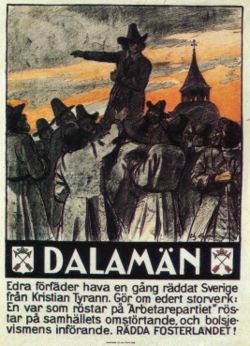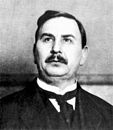General elections were held in Sweden between 15 and 21 September 1928.[1] The Swedish Social Democratic Party remained the largest party, winning 90 of the 230 seats in the Andra kammaren of the Riksdag.[2] Arvid Lindman of the General Electoral League became Prime Minister, replacing the incumbent, Carl Gustaf Ekman of the Free-minded National Association. The elections have since become known as the "Cossack Election" due to the harsh tone and aggressive criticism used by both sides.
| |||||||||||||||||||||||||||||||||||||||||||||||||||||||||||||||||||||
All 230 seats in the Andra kammaren of the Riksdag | |||||||||||||||||||||||||||||||||||||||||||||||||||||||||||||||||||||
|---|---|---|---|---|---|---|---|---|---|---|---|---|---|---|---|---|---|---|---|---|---|---|---|---|---|---|---|---|---|---|---|---|---|---|---|---|---|---|---|---|---|---|---|---|---|---|---|---|---|---|---|---|---|---|---|---|---|---|---|---|---|---|---|---|---|---|---|---|---|
| |||||||||||||||||||||||||||||||||||||||||||||||||||||||||||||||||||||
 Largest bloc and seats won by constituency | |||||||||||||||||||||||||||||||||||||||||||||||||||||||||||||||||||||
| |||||||||||||||||||||||||||||||||||||||||||||||||||||||||||||||||||||

Results edit
 | |||||
|---|---|---|---|---|---|
| Party | Votes | % | Seats | +/– | |
| Swedish Social Democratic Party | 873,931 | 37.05 | 90 | –14 | |
| General Electoral League | 692,434 | 29.36 | 73 | +8 | |
| Free-minded National Association | 303,995 | 12.89 | 28 | –1 | |
| Farmers' League | 263,501 | 11.17 | 27 | +4 | |
| Communist Party | 151,567 | 6.43 | 8 | +4 | |
| Liberal Party | 70,820 | 3.00 | 4 | 0 | |
| Other parties | 2,563 | 0.11 | 0 | 0 | |
| Total | 2,358,811 | 100.00 | 230 | 0 | |
| Valid votes | 2,358,811 | 99.81 | |||
| Invalid/blank votes | 4,490 | 0.19 | |||
| Total votes | 2,363,301 | 100.00 | |||
| Registered voters/turnout | 3,505,672 | 67.41 | |||
| Source: Nohlen & Stöver | |||||
References edit
- ^ Dieter Nohlen & Philip Stöver P (2010) Elections in Europe: A data handbook, p1858 ISBN 978-3-8329-5609-7
- ^ Nohlen & Stöver, p1872
External links edit

Wikimedia Commons has media related to Swedish general election, 1928.
🔥 Top keywords: Akademia e Shkencave e RPS te ShqiperiseAlexandria Ocasio-CortezBilderberg GroupCristiano RonaldoDong XiaowanMinecraftOperation GladioPrimal cutRiot FestStrictly Come Dancing (series 7)Main PageSpecial:SearchWikipedia:Featured picturesEbrahim RaisiToni KroosCleopatraAli Khamenei2024 Indian general electionDeaths in 2024Austin MaddoxNikki Catsouras photographs controversyPhilip GaleYouTubeBridgertonMark Kerr (fighter)Karim Ahmad Khan2024 Varzaqan helicopter crashKepler's SupernovaTerrence HowardArne SlotXXXTentacionAmal ClooneyOleksandr UsykNew CaledoniaKing and Queen of the Ring (2024)EminemIranNicola CoughlanScarlett JohanssonHeeramandiKingdom of the Planet of the ApesAdria ArjonaInternational Criminal CourtXXX (film series)XXX: Return of Xander CageRiley KeoughAnthony Edwards (basketball)President of IranThe Fall Guy (2024 film)





